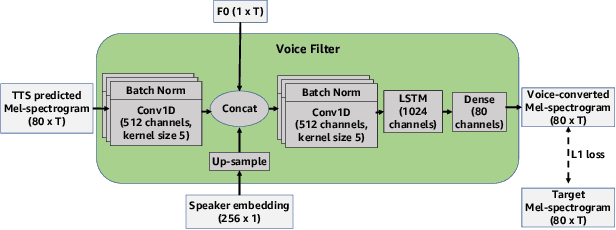Bartek Perz
Gemini: A Family of Highly Capable Multimodal Models
Dec 19, 2023Abstract:This report introduces a new family of multimodal models, Gemini, that exhibit remarkable capabilities across image, audio, video, and text understanding. The Gemini family consists of Ultra, Pro, and Nano sizes, suitable for applications ranging from complex reasoning tasks to on-device memory-constrained use-cases. Evaluation on a broad range of benchmarks shows that our most-capable Gemini Ultra model advances the state of the art in 30 of 32 of these benchmarks - notably being the first model to achieve human-expert performance on the well-studied exam benchmark MMLU, and improving the state of the art in every one of the 20 multimodal benchmarks we examined. We believe that the new capabilities of Gemini models in cross-modal reasoning and language understanding will enable a wide variety of use cases and we discuss our approach toward deploying them responsibly to users.
Voice Filter: Few-shot text-to-speech speaker adaptation using voice conversion as a post-processing module
Feb 16, 2022



Abstract:State-of-the-art text-to-speech (TTS) systems require several hours of recorded speech data to generate high-quality synthetic speech. When using reduced amounts of training data, standard TTS models suffer from speech quality and intelligibility degradations, making training low-resource TTS systems problematic. In this paper, we propose a novel extremely low-resource TTS method called Voice Filter that uses as little as one minute of speech from a target speaker. It uses voice conversion (VC) as a post-processing module appended to a pre-existing high-quality TTS system and marks a conceptual shift in the existing TTS paradigm, framing the few-shot TTS problem as a VC task. Furthermore, we propose to use a duration-controllable TTS system to create a parallel speech corpus to facilitate the VC task. Results show that the Voice Filter outperforms state-of-the-art few-shot speech synthesis techniques in terms of objective and subjective metrics on one minute of speech on a diverse set of voices, while being competitive against a TTS model built on 30 times more data.
EmoCat: Language-agnostic Emotional Voice Conversion
Jan 14, 2021

Abstract:Emotional voice conversion models adapt the emotion in speech without changing the speaker identity or linguistic content. They are less data hungry than text-to-speech models and allow to generate large amounts of emotional data for downstream tasks. In this work we propose EmoCat, a language-agnostic emotional voice conversion model. It achieves high-quality emotion conversion in German with less than 45 minutes of German emotional recordings by exploiting large amounts of emotional data in US English. EmoCat is an encoder-decoder model based on CopyCat, a voice conversion system which transfers prosody. We use adversarial training to remove emotion leakage from the encoder to the decoder. The adversarial training is improved by a novel contribution to gradient reversal to truly reverse gradients. This allows to remove only the leaking information and to converge to better optima with higher conversion performance. Evaluations show that Emocat can convert to different emotions but misses on emotion intensity compared to the recordings, especially for very expressive emotions. EmoCat is able to achieve audio quality on par with the recordings for five out of six tested emotion intensities.
 Add to Chrome
Add to Chrome Add to Firefox
Add to Firefox Add to Edge
Add to Edge